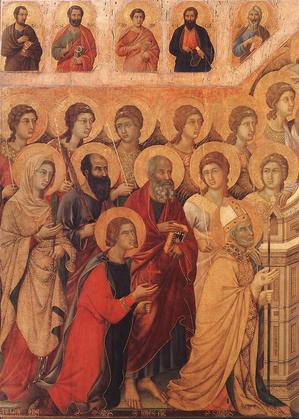
Getting closer and closer to Pentecost Sunday that Church's selections from the Acts of the Apostles gives a clearer sense of how grace works in the life of the Christian community. Today's feast of Saint Matthias, one of the elected apostles (Acts 1:15-26) replacing Judas shows how discernment of spirit works to provide apostolic continuity in pastoral authority and power. Discernment is never one-sided; it is always a two-way street on the part of the man and on the part of the Church to choose who serves as an ordained minister of the Gospel. Matthias' vocation to replace Judas as one of the bishops was given to him; neither he nor single one person had the power to make the selection; it was done with in the midst of the community because the community is a place to encounter the living, resurrected Christ. Moreover, one can't say that Saint Matthias gained much: he preached the Truth of the Gospel, confirmed the faith and he lost his life: nothing greater than the love he had for Christ Jesus propelled him to serve with all his heart.
Note what the Collect of the Mass prays: God assigned Saint Matthias a place of service and pastoral responsibility and it is our hope to numbered among the elect, that is, among the saved. Key here is God's action in each of our lives; it is not our own desires alone that makes salvation possible. We are meant to share the lot of the saints, but our freedom and God's grace need to be operative for this gift to be realized.
Matthias met his Savior by crucifixion in Judea and his mortal remains are located at Saint Matthew's Abbey, Trier, Germany.
As the Church prays,
O God, who assigned Saint Matthias a place in the college of Apostles, grant us, through his intercession, that, rejoicing at how your love has been allotted to us, we may merit to be numbered among the elect.
The following selection from a sermon of Saint John Chrysostom on Saint Matthias may be instructive on the early practice of ecclesiological need.
"In those days, Peter, stood up in the midst of the disciples and said," as the fiery spirit to whom the flock was entrusted by Christ and as the leader in the band of the apostles, Peter always took the initiative in speaking: 'My brothers, we must choose from among our number.' He left the decision to the whole body, at once augmenting the honor of those elected and avoiding any suspicion of partiality." For such great occasions can easily lead to trouble.
Did not Peter then have the right to make the choice himself? Certainly he had the right, but he did not want to give the appearance of showing special favor to anyone. Besides he was not yet endowed with the Spirit. "And they nominated two," we read, "Joseph, who was called Barsabbas and surnamed Justus, and Matthias." He himself did not nominate them; all present did. But it was he who brought the issue forward, pointing out that it was not his own idea but had been suggested to him by a scriptural prophecy. So he was speaking not as a teacher but as an interpreter.
"So," he goes on, "we must choose from those men who lived in our company." Notice how insistent he is that they should be eyewitnesses. Even though the Spirit would come to ratify the choice, Peter regards this prior qualification as most important.
"Those who lived in our company," he continued, "all through the time when the Lord Jesus came and went among us. He refers to those who had dwelt with Jesus, not just those who had been his disciples. For of course from the very beginning many had followed him. Notice how it is written that Peter himself was "one of the two who had listened to John, and followed Jesus."
"All through the time when the Lord Jesus came and went among us, beginning with the baptism of John" - rightly so, because no one knew what had happened before that time, although they were to know of it later through the Spirit.
"Up to the day," Peter added, "on which he was taken up from us - one of these must be made a witness along with us of his resurrection." He did not say "a witness of the rest of his actions" but only "a witness of the resurrection." That witness would be more believable who could declare that he who ate and drank and was crucified also rose from the dead. He needed to be a witness not of the times before or after that event, and not of the signs and wonders, but only of the resurrection itself. For the rest happened by general admission, openly; but the resurrection took place secretly, and was known to these men only.
And they all prayed together, saying: "You, Lord, know the hearts of men; make your choice known to us." "You", not "we". Appropriately they said that he knew the hearts of men, because the choice was to be made by him, not by others.
They spoke with such confidence, because someone had to be appointed. They did not say "choose" but "make known to us" the chosen one; "the one you choose," they said, fully aware that everything was pre-ordained by God. "They then drew lots." For they did not think themselves worthy to make the choice of their own accord, and therefore they wanted some sign for their instruction.



Leave a comment